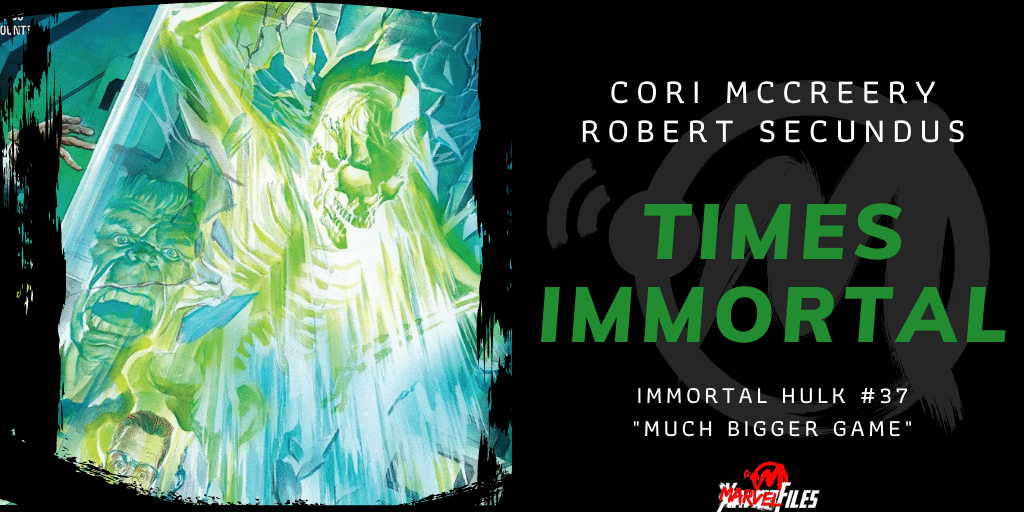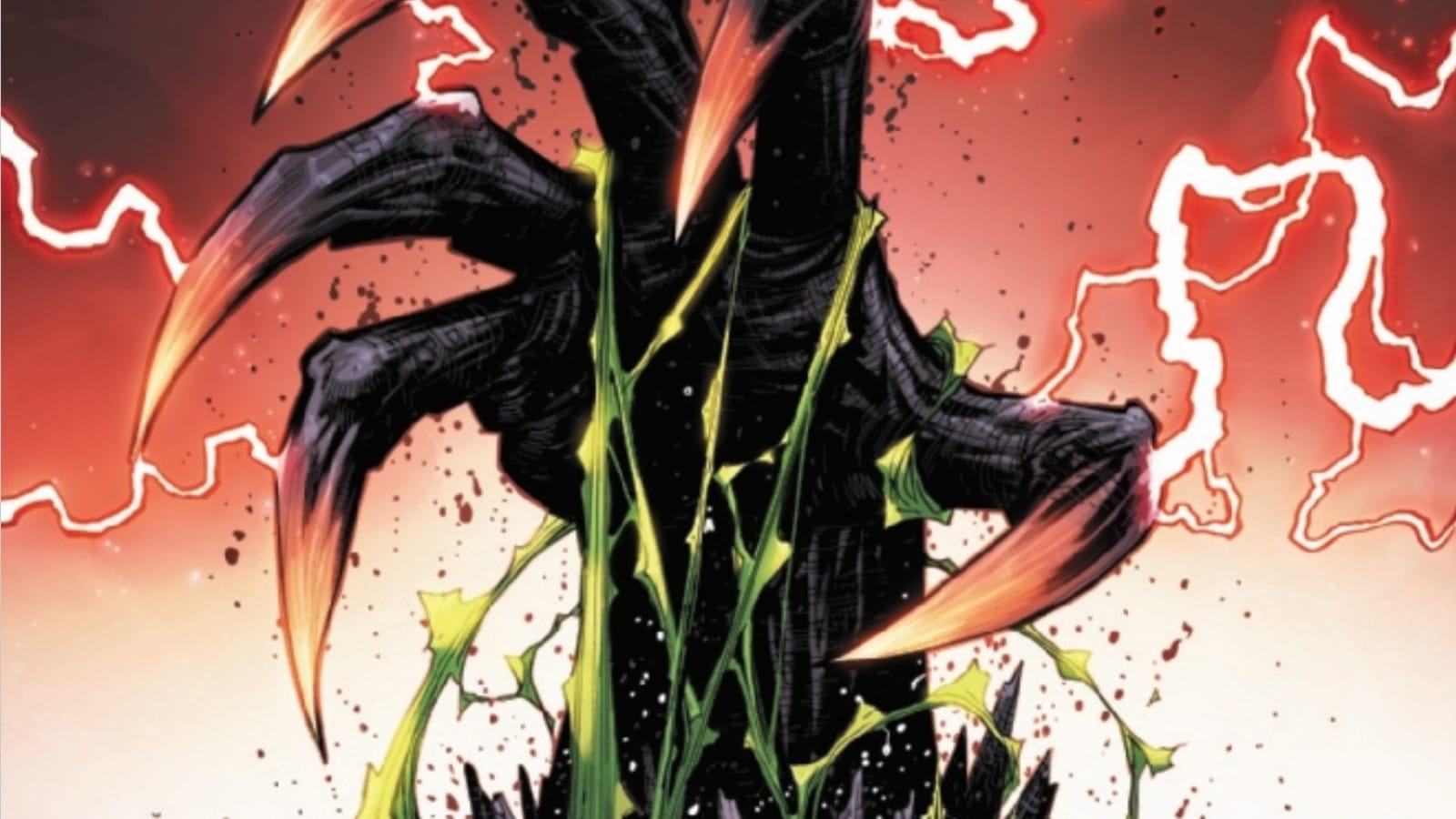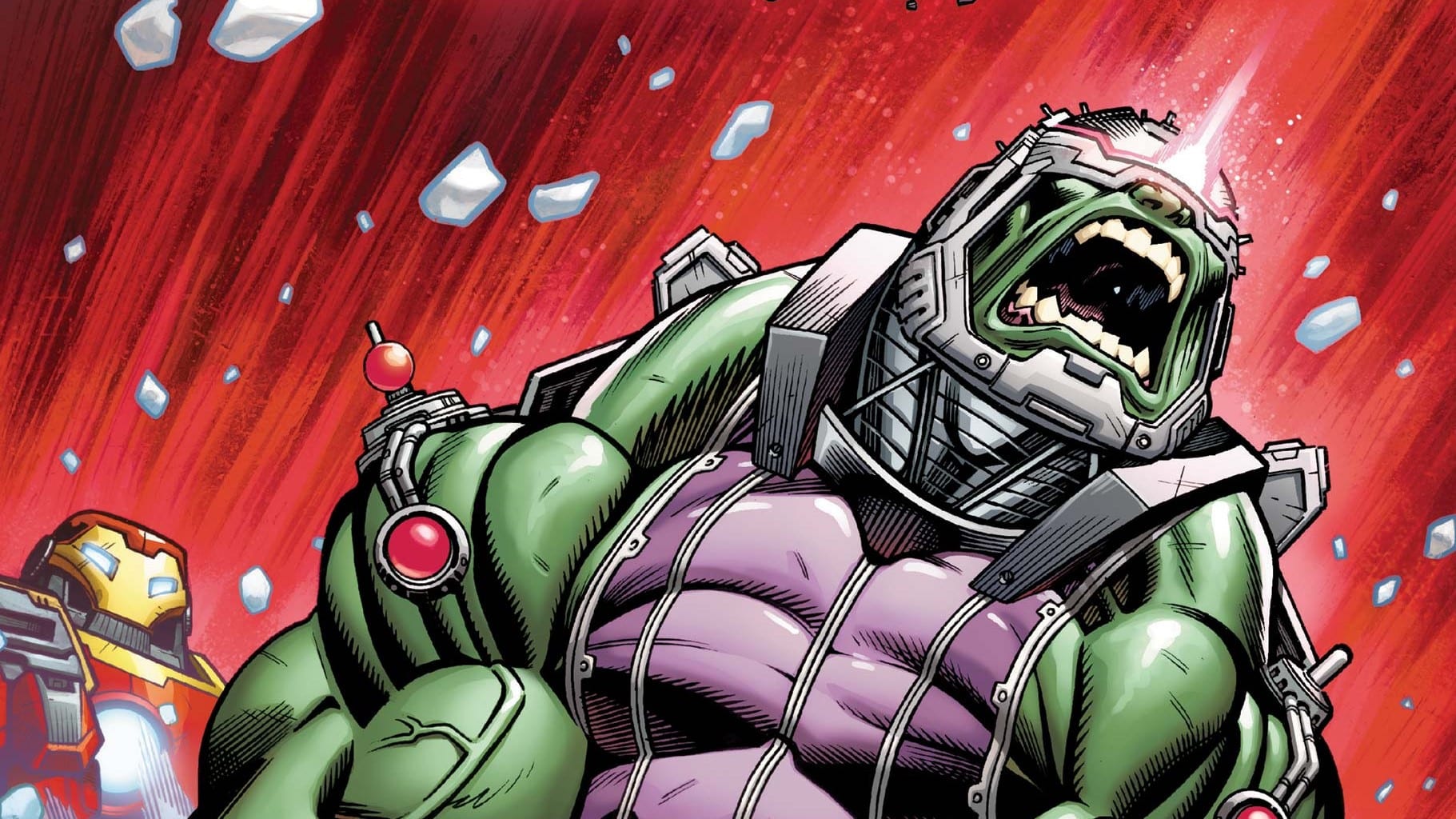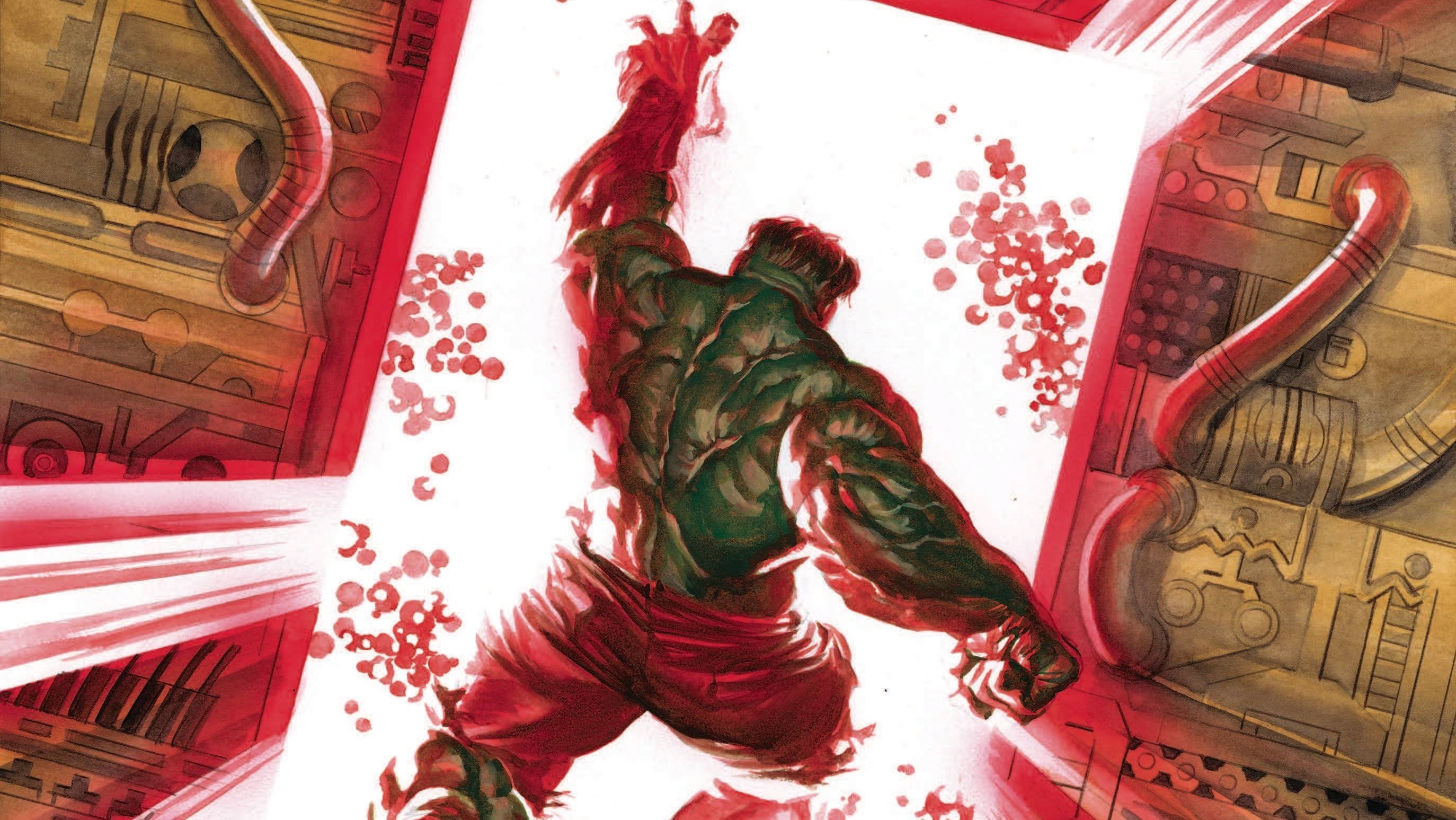The Leader’s plans come to cruel fruition as Hulk fights off the Gamma Corps in another dynamite issue by Al Ewing, Joe Bennett, Ruy José, Belardino Brabo, Paul Mounts, and VC’s Cory Petit.
Robert Secundus: Did anyone else ever watch the Disney Movie The Big Green growing up? It was about a soccer team of misfits coached by a dude who wanted to use children’s success in sports to impress and, eventually, engage in carnal embrace with the new British schoolteacher. The goalie was real bad because whenever an opposing team would try to score, his perception would warp, he would see them demonically transformed into horrifying versions of whatever their team name was. The soccer field, the “green,” for his teammates was a place of frustration; for his coach, the path to erotic bliss; but for him, for the goalie, it was a kind of Hell. I keep running out of ideas for intros so I just wanted to share that with you all.
Cori McCreery: Wow, starting right out with carnal embraces this month huh? It’s gonna be one of those fun romps, I can just tell. Fun romps is entirely what we read this book for right? Right? *sobs quietly, a broken shell of a person*
“If the doors of perception were cleansed everything would appear to man as it is, infinite.”
RS: This comic opens with a quotation from William Blake’s marriage of heaven and hell. Of course, as the title makes clear, Blake engages with the infernal subject matter that has been so often the subject of this series. Blake’s Hell, however, is a bit less traditional than the one seen here. For Blake, the material desires and experiences often associated with Satan aren’t evil things. For Blake, Satan (at least, the Satan of Paradise Lost) is a hero. The passage quoted appears shortly after the Blake-character in the poem dines with Ezekiel and Isaiah, and speaks with them on matters of poetry, prophecy, and perception. The quote in full reads:
The ancient tradition that the world will be consumed in fire at the end of six thousand years is
true, as I have heard from Hell.
For the cherub with his flaming sword is hereby commanded to leave his guard at [the] tree of life,
and when he does, the whole creation will be consumed and appear infinite and holy, whereas it
now appears finite and corrupt.
This will come to pass by an improvement of sensual enjoyment.But first the notion that man has a body distinct from his soul is to be expunged; this I shall do by
printing in the infernal method by corrosives, which in Hell are salutary and medicinal, melting
apparent surfaces away, and displaying the infinite which was hid.
If the doors of perception were cleansed everything would appear to man as it is, infinite.For man has closed himself up, till he sees all things through narrow chinks of his cavern.
RS: Blake’s ideas influenced, among others, Aldous Huxley, and Huxley used this quote for the title of his book Doors of Perception, which was about doing cool drugs and, how like, mescaline can totally open your mind’s eye and stuff. Etc etc. (It also influenced Age of X-Man and, presumably, Nate Grey).
CM: Ah so a different lesser known Huxley book about doing cool drugs. Seems to be a theme with him. Makes one think, doesn’t it? I also think about how the hell of this book is so personalized to Banner’s identity, and how that must affect the others who come into contact with it. It’s such a deeply personal reflection for Bruce, a wasteland that is a stark reminder of the location where his life ended and the monster’s life began. As such it is a little unnerving when people that don’t have this same attachment to a gamma test ground are forced to experience it, due mostly only to their exposure to Bruce. What must this hell seem like for Samson? For Betty? For the Leader himself?
RS: I’d never noticed the relationship between the hellscape and the landscape of The Incredible Hulk #1. That’s extremely interesting. I wonder if the visual nomenclature here might not also be related to how we, generally think of hell or hellishness today too. Our world’s Hell– the natural damnation our capitalist society has earned– is the dustbowl-wasteland of climate change, the nuclear testing sites of the atomic bomb. It’s very personal to Bruce’s story, but that story in 1962 forecasts our present.
CM: You make an excellent point there. It’s still a region specific climate hell, one that I’ve been living through as fires ravage the entire west coast, while other regions of the world are experiencing increased tropical storms, and yet others are dealing with freak blizzards that occur earlier and earlier in the year. The same hubris that created the Hulk in the Marvel Universe is the hubris that has all but destroyed our natural world in Earth-616 . What relates the Hellscape to climate change also ties us to the long game of this series, since Roxxon represents that very real evil here. We’ve moved focus away from them and on to the Leader as our central villain, and hoo boy is it terrifying watching his plans come to fruition here.
“Let Me Take The Lead”
RS: The Leader seems to be increasingly established not just as this next arc’s villain, but as the antagonistic figure of the run. He has power over the green (and now red) doors of death; he has controlled (or merged with?) one of the Hulk’s own personalities, the Green Scar; he has inhabited the body of the poor kid we saw way back in Immortal Hulk #1. Cori, what do you make of the Leader’s rising import? How is his prominence working for you, narratively and thematically?
CM: I think it’s absolutely brilliant to show how he’s been subtly manipulating the strings for 37 issues now. We didn’t even know he was here, but he was still the one in charge of just about everything that’s gone balls up in this. His influence through the green door is terrifying, because it means that he has influence over everyone connected to the Gamma. It will be interesting to see how much that influence plays out with other more recognized characters than it did with poor Del. What do you think about how much power the Leader obviously has here?
RS: First of all, it takes a character that could be generic (telepath! Smart guy! BUT GREEN) and makes him feel incredibly terrifying. Power over these indescribable forces transforms him into a cosmic threat. But it also does something interesting to the overall arc of the book; it’s not the Capitalist Minotaur, not the Propaganda Media Yeti, but the Powerful Guy Who Holds Onto Power, Who Fucks With Stuff Just Because He Can that is the major threat. It’s like– Mark Zuckerberg helped kill our society, but focusing too much on men like him can really mislead us as we critique that society. There’s a way in which an emphasis on businessmen almost excuses the evils of our capitalistic society– this person wants wealth, so he did the thing that accrues wealth. This corporation is designed to accrue wealth, so it functions as designed; sometimes it can sound like we suffer at the hands of amoral robots. But think about the people who use Facebook to hurt. Think about the people in power who don’t just get themselves tax cuts, but actively work to destroy lives that have nothing to do with their bottom line. Think about the arrogance and the hate of the powerful. And I think then it becomes clear how/ why this book, which takes our capitalistic hellscape and boils it down to a superhero story, would move to focus on this character.
CM: I think part of it that’s on the nose is that this is someone who has always been there. The Leader is one of the oldest antagonists in the Hulk mythos, showing up alongside Hulk in just the tenth solo story of the green behemoth. So it makes your analysis even more poignant, in that this is someone holding onto power for nothing more than to hold onto it, like certain elected officials that have been in power for decades. He enjoys using his power to make other people miserable. He’s a sadistic little monster who likes to watch the suffering that he enacts, and then enacts more just as a little treat for himself. I also love how Bennett depicts the Leader within the hellscape, all long gangly limbs save for a giant monstrous head. The expressions Bennett uses for him are creepy and unnerving, and his form emphasizes that his power is all psychological and mental rather than in any way physical. He’s a dominating force, but in the way that a Hulk villain has to be, you can’t win against him physically, so you must find other ways, and our buddy Sam is doing that by exerting telepathic influence on all of Bruce’s allies. Knowing that the Leader has full control of Rick terrifies me, because as of the end of the issue it places Dr. McGowan in mortal peril.
The Hulk Below
RS: Speaking of Mortal Peril, this issue ends with (as every issue of Immortal Hulk does) a shocking cliffhanger. The Hulk– not Bruce Banner, not the Devil Hulk, but the Hulk, the one everyone knows– is dead and in Hell. Cori, what do you think of this turn of events?
CM: Ruhroh Raggy. It’s clear that this is just another part of the Leader’s plan, as we see him count in three different forms before Puck shoots Hulk. We see him count as Rick, as his gamma radiation form, and finally, as the Green Scar on a field of black. It’s clear that there is something that the Leader can do to muck with the traditional immortality of the Hulk, and one has to wonder if that’s how he infected Green Scar. With Scar corrupted and Devil Hulk awol, the death of Hulk is catastrophic for Banner. I keep thinking that the cliffhangers can’t possibly keep topping each other, but here we are.
RS: Something that’s really struck me is that the series not only keeps upping the ante on horror but also on sadness. Like, this hulk is so SAD. He just wanted to save his friends! He was so confused about why his other friends were hurting him! And how does it end? With him literally being damned to actual HELL, where, presumably, he’ll be tortured by this enemy he probably does not have the capacity to fully understand. I was heartbroken by this arc.
CM: Oof yeah, I hadn’t thought about how this Hulk wouldn’t be able to comprehend just why the Leader hates him. Even the plus side that McGowan did what he wanted and saved Rick is traumatic because it’s not Rick. Hulk just wanted Rick protected, but Rick was already out of the equation. Like you said, it’s absolutely heartbreaking, and I don’t think it’s going to get better before it gets worse.
Marvelous Musings
- At the climax of The Big Green, the goalie changes the way he perceives himself, and transforms into a conglomerate mega-monster of all the teams they have faced throughout the film. It is implied that his belief in this image is so strong that the opposing team has a vision of this form; this vision shakes their courage, and the heroes win the final game, clinching their coach’s romantic future.
- This does not happen, as far as we know, in Immortal Hulk.







